|
|
|
Sort Order |
|
|
|
Items / Page
|
|
|
|
|
|
|
| Srl | Item |
| 1 |
ID:
162972
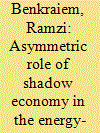

|
|
|
|
|
| Summary/Abstract |
This paper estimates the energy demand function to examine the asymmetric relationship between the shadow economy and energy consumption in the case of Bolivia during the period of 1960–2015. The ambiguous empirical findings on shadow economy-energy demand nexus has inclined us to apply the nonlinear ARDL cointegration approach developed by Shin et al. (2014) and the Hatemi-J (2012) asymmetric causality test. The empirical evidence confirms the presence of an asymmetric relationship between the variables of interest. Positive and negative shocks to official GDP (true GDP) and the shadow economy have positive impacts on energy consumption. Energy consumption is positively and negatively affected by positive and negative shocks in financial development, respectively. A positive (negative) shock to capital decreases energy consumption. Another important finding concerns the complex causal direction between economic growth and energy consumption. This study provides new insights regarding to the use of official GDP (true GDP) and the shadow economy as economic tools to maintain energy demand for sustainable economic development.
|
|
|
|
|
|
|
|
|
|
|
|
|
|
|
|
| 2 |
ID:
152958


|
|
|
|
|
| Summary/Abstract |
This issue of Small Wars and Insurgencies focuses on the continuing importance of Maoist and post-Maoist concepts of people’s war. It has assembled a collection of papers that addresses various examples from around the world, with an emphasis on South America, where the premier illustration, that of Colombia’s FARC, was Marxist-Leninist but not Maoist, yet embraced the form and strategy of people’s war in a bid which at one point had the state in a critical situation. The collection comes in the wake of previous papers published in this journal on politically Maoist insurgent movements in South Asia, notably Mika Kerttuenen’s study of Maoist insurgents in Nepal and Prem Mahadevan’s survey of Maoist insurgencies in India and their links to organized crime (Kerttunen, “A Transformed Insurgency,” 78–118; Mahadevan, “The Maoist Insurgency in India,” 203–20). The papers confirm that people’s war remains an important analytical framework in the study of small wars and insurgencies, for some even a ‘model’ through which to understand distinct types of insurgent movements and their strategies.
|
|
|
|
|
|
|
|
|
|
|
|
|
|
|
|
| 3 |
ID:
077224


|
|
|
|
|
| Publication |
2007.
|
| Summary/Abstract |
In the 1990s, Bolivia's indigenous population mobilized to claim new political roles, and in the process, directly challenged the privileged position of economic elites within national political institutions. In response, business associations in Santa Cruz, Bolivia's most prosperous region, began to demand regional autonomy-in contrast to the demand for authoritarianism that characterized prior generations of business elites when confronted with threatening political change. After examining Santa Cruz' past relationship with the national government, this article explores the challenges that led economic elites in the department to seek autonomy and the strategies that they have adopted in pursuit of this goal.
|
|
|
|
|
|
|
|
|
|
|
|
|
|
|
|
| 4 |
ID:
097148


|
|
|
| 5 |
ID:
073443
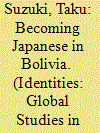

|
|
|
|
|
| Publication |
2006.
|
| Summary/Abstract |
This article chronicles the changing subject-positions of Okinawans in Bolivia from the 1950s to 1990s, who migrated to Colonia Okinawa, an agricultural settlement in the eastern Santa Cruz region, as sponsored migrants backed by the United States military administration and the Okinawan (Ry?ky?) government. Since the forced annexation of Okinawa by Imperial Japan in 1879, Okinawans and the Okinawan Diaspora have often been discriminated against by the Japanese government and the immigrants from mainland Japan as illegitimate Japanese national subjects. The lack of active intervention by the Japanese government and the virtual absence of Japanese mainlanders in the settlement, however, enabled the Okinawan settlers to maintain their Okinawan cultural identities and practices without being questioned about their legitimacy as Japanese. Underscored by their socioeconomic success as large-scale farm owners who employed the locals as inexpensive laborers, the settlers gradually shifted their primary identification from "Okinawan" to "Japanese" in the particular social contexts of Colonia Okinawa. The settlers' concern about their children's cultural assimilation into the local Bolivian population led them to stress the Japanese-Bolivian polarity, while relegating the troubled history between Japan and Okinawa into the background. As a result, Okinawans in Colonia Okinawa, despite their status as formerly colonized subjects under Imperial Japan, "became" Japanese-vis-à-vis local Bolivians-without culturally becoming as one.
|
|
|
|
|
|
|
|
|
|
|
|
|
|
|
|
| 6 |
ID:
059016
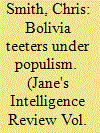

|
|
|
| 7 |
ID:
152967
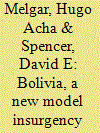

|
|
|
|
|
| Summary/Abstract |
In Bolivia, a brilliantly executed insurgency was carried out between 1995 and 2005, so much so that few perceived it as such. Its most important characteristic was its correct evaluation of the relative correlation of forces and application of the right combination of all forms of struggle. This was possible because of its pragmatism. Though not bound by ideological dogmatism, it nonetheless displayed a deep understanding of insurgency and revolutionary theory. This allowed adaptation and evolution in a changing context. The main form of struggle was not military violence, although it was not absent, but rather violent social protest funded by drug trafficking proceeds. The strategy thus neutralized traditional counterinsurgency models, because it made it difficult to apply coercive force as the enemy was not clearly identifiable. Its success in Bolivia means that the emergence of a new model of insurgency, one still built upon the popular mobilization of people’s war but more attuned to new global realities, is a reality.
|
|
|
|
|
|
|
|
|
|
|
|
|
|
|
|
| 8 |
ID:
185626
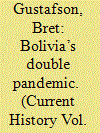

|
|
|
|
|
| Summary/Abstract |
The November 2019 ouster of President Evo Morales, followed by the interim government’s harsh crackdown on his supporters, plunged Bolivia into a political crisis just as the COVID-19 pandemic arrived with devastating effect. The interim government’s haphazard response was marred by corruption scandals over procurement of medical supplies. After several delays, a general election was finally held in October 2019. Luis Arce, the presidential candidate of Morales’s Movement Toward Socialism, won decisively. But Morales’s subsequent return from exile signaled that the struggle over his legacy would continue.
|
|
|
|
|
|
|
|
|
|
|
|
|
|
|
|
| 9 |
ID:
111808
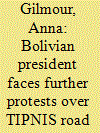

|
|
|
| 10 |
ID:
123711
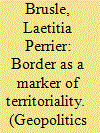

|
|
|
|
|
| Publication |
2013.
|
| Summary/Abstract |
This paper considers the film Frozen River (2008) for the purpose of considering how the US-Canadian border is dramatised within the context of two women caught up in a illicit trading of migrants via a Native American Reservation. Re-calibrating more mainstream Hollywood's fascination with the United States' southern border, Frozen River usefully focuses attention on two areas that deserve further reflection namely the materiality of borders and border crossings and biopolitics. The paper concludes with some reflections on how borders, biopolitics, dispossession and sovereignty need further theorization by political geographers and other scholars.
|
|
|
|
|
|
|
|
|
|
|
|
|
|
|
|
| 11 |
ID:
184235
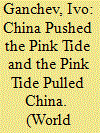

|
|
|
|
|
| Summary/Abstract |
This article examines the rise of leftist ideology in Ecuador and Bolivia in light of their deepening economic relations with China from 2005 to 2014. First, it reveals that market trends account for trade fluctuations but fail to explain Chinese investment in, and some loan deals with, Ecuador as well as loans to Bolivia. Second, it demonstrates how these forms of funding provided alternatives to U.S.-led international institutions, enabling Rafael Correa and Evo Morales to steer away from Western influence. Third, it contends that four factors led to a cyclic reinforcement of Chinese economic interests and the rise of leftist ideology in Ecuador and Bolivia, namely: mutual complementarity between China’s demand for energy/natural resource supply diversification and Pink Tide development agendas; U.S.–China geopolitical competition for influence in Latin America; China’s experience in engaging with leftist governments from developing countries; and anti-Americanism shaping national identity in Ecuador and Bolivia.
|
|
|
|
|
|
|
|
|
|
|
|
|
|
|
|
| 12 |
ID:
064645
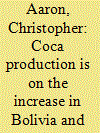

|
|
|
| 13 |
ID:
040506
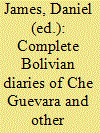

|
|
|
|
|
| Publication |
London, George Allen and Unwin, 1968.
|
| Description |
330p.: ill, maps.Hbk
|
| Standard Number |
049040022
|
|
|
|
|
|
|
|
|
|
|
|
Copies: C:1/I:0,R:0,Q:0
Circulation
| Accession# | Call# | Current Location | Status | Policy | Location |
| 001783 | 920.932712/JAM 001783 | Main | On Shelf | General | |
|
|
|
|
| 14 |
ID:
110111
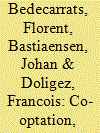

|
|
|
|
|
| Publication |
2012.
|
| Summary/Abstract |
The past decade has been marked by the resurgence of leftist political movements across Latin America. The rise of the 'new left' masks the ambivalent relationships these movements have with broader society, and their struggle to find an alternative to the prevailing development model. Filling the void left by failed public banks, the microfinance sector has grown significantly across the continent in an increasingly commercial form. Analysis of Nicaragua, Ecuador and Bolivia reveals that their new governments share a common distrust of microfinance. Yet, in the absence of viable alternatives for financial service provision, governments and microfinance stakeholders are forced to coexist. The environment in which they do so varies greatly, depending on local political and institutional factors. Some common trends can nevertheless be discerned. Paradoxically, the sector seems to be polarised into two competing approaches which reinforce the most commercially oriented institutions on the one hand, and the most subsidised on the other, gradually eliminating the economically viable microfinance institutions which have tried to strike a balance between social objectives and the market.
|
|
|
|
|
|
|
|
|
|
|
|
|
|
|
|
| 15 |
ID:
100564
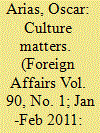

|
|
|
|
|
| Publication |
2011.
|
| Summary/Abstract |
Latin Americans must look in the mirror and confront the reality that many of our problems lie not in our stars but in ourselves. Only then will the region finally attain the development it has so long sought.
|
|
|
|
|
|
|
|
|
|
|
|
|
|
|
|
| 16 |
ID:
143571
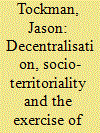

|
|
|
|
|
| Summary/Abstract |
This article analyses the ‘indigenous autonomy’ being constructed in two dozen Bolivian municipalities and territories, in accordance with the 2009 Constitution. It finds that Bolivia’s 1994 decentralisation reforms, which created the country’s system of municipalities, are central to understanding the contemporary implementation of indigenous autonomy. Some indigenous people view as favourable the representative and material gains achieved by municipalisation, which helps explain why more majority-indigenous communities have not yet chosen the new option of indigenous autonomy. However, the new legal framework also limits indigenous self-governance, because territorial delimitations of the country’s municipalities are generally inconsistent with indigenous peoples’ ancestral territories. The new institutions of self-governance are legally obligated to include discrete legislative, executive and administrative functions, reflecting not indigenous norms but a municipal structure of liberal design. This study illustrates the way that indigenous self-determination may encounter obstacles where indigenous territorial jurisdictions must coincide with contemporary boundaries of colonial origins, rather than with pre-colonial territories.
|
|
|
|
|
|
|
|
|
|
|
|
|
|
|
|
| 17 |
ID:
086018
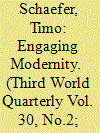

|
|
|
|
|
| Publication |
2009.
|
| Summary/Abstract |
Most analyses of the recent indigenous mobilisations in Bolivia and Ecuador (as well as other Latin American countries) have sharply divided the new indigenous politics from earlier class-based political projects of the left. The emergence and mass-appeal of indigenous movements, in these analyses, are rooted in ethnic and cultural cleavages between indigenous peoples and the rest of Bolivian and Ecuadorean society. This article argues that a political interpretation of indigenous movements in these countries gives a more coherent explanation for their historical trajectories as well as their present situation, in particular their high degree of articulation with other popular political actors. Its historical section describes the emergence of indigenous movements in Bolivia and Ecuador as part of an engagement with modernity that began in the first half of the twentieth century as part of the cross-ethnic projects of unions and radical parties of the traditional left and put indigenous communities into positive relationships to the modernizing Bolivian and Ecuadorean states.
|
|
|
|
|
|
|
|
|
|
|
|
|
|
|
|
| 18 |
ID:
122817
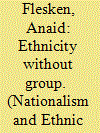

|
|
|
|
|
| Publication |
2013.
|
| Summary/Abstract |
This article examines recent changing dynamics of indigeneity in Bolivia. It argues that despite competing definitions of the indigenous on the basis of attributes as diverse as skin color or vocation, the category is invested with meaning and used as a basis for collective action. Yet, debates surrounding the constitution of 2009 show that clearly defined attributes are necessary for such action to have a lasting effect. Overall, the mobilization has not led to the manifestation of ethnic categories, as observed elsewhere, but to increased contestation. The case suggests a fruitful analytical distinction between attributes, meaning, and action in ethnic dynamics.
|
|
|
|
|
|
|
|
|
|
|
|
|
|
|
|
| 19 |
ID:
144258
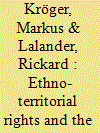

|
|
|
|
|
| Summary/Abstract |
In recent times a growing number of Latin American rural groups have achieved extended ethno-territorial rights, and large territories have been protected by progressive constitutions. These were the outcomes of extended cycles of national and transnational contentious politics and of social movement struggle, including collective South–South cooperation. However, the continent has simultaneously experienced a resource extraction boom. Frequently the extractivism takes place in protected areas and/or Indigenous territories. Consequently economic interests collide with the protection and recognition of constitutional rights. Through a review of selected demonstrative cases across Latin America, this article analyses the (de jure) rights on paper versus the (de facto) rights in practice.
|
|
|
|
|
|
|
|
|
|
|
|
|
|
|
|
| 20 |
ID:
148273
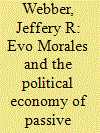

|
|
|
|
|
| Summary/Abstract |
While the government of Evo Morales rules in the name of indigenous workers and peasants, in fact the country’s political economy has since 2006 witnessed the on-going subjugation of these classes. If the logic of large capital persists, it is legitimated in and through petty indigenous capitalists. This article argues that Antonio Gramsci’s conceptualisation of passive revolution offers a superior analytical point of departure for understanding contemporary Bolivian politics than does Álvaro García Linera’s more widely accepted theory of creative tensions. However, the dominant manner in which passive revolution has been employed in contemporary Latin American debates has treated the socio-political and the ideological as relatively autonomous from the process of capital accumulation. What is necessary, instead, is a sharper appreciation of the base/superstructure metaphor as expressing a dialectical unity of internal relations between ‘the economic’ and ‘the political’, thus avoiding one determinism or another. Through a reading of Gramsci that emphasises such unity, this article interrogates the dynamics of ‘extractive distribution’, class contradictions of the ‘plural economy’, and transformations in the urban labour market which have characterised Bolivia’s passive revolution under Evo Morales between 2006 and 2015.
|
|
|
|
|
|
|
|
|
|
|
|
|
|
|
|
|
|
|
|
|